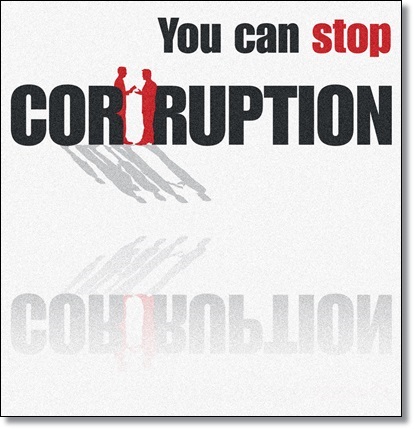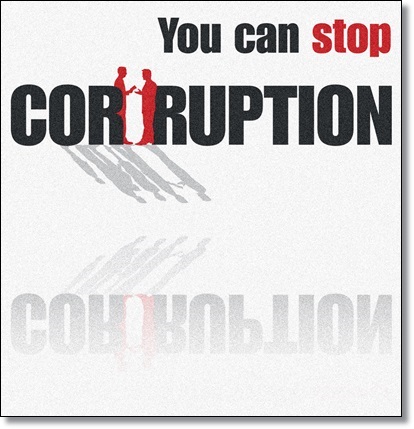Kenya: War on Corruption a Mirage

Introduction

Kenya’s decades old ‘war against corruption’ has seen little achievements in ensuring public accountability and reduction of impunity in the country. Acts of corruption in the public sector have become a prevailing everyday phenomenon in the lives of most Kenyans. The police openly extort public transport at almost every 200 meters. Acts of corruption are engrained so much into the socio-economic and political structures in Kenya that it seems the only time one is spared of paying kitu kidogo or bribes is when they are asleep or when they are on their death bed. Corruption continues in whether or not the country’s anti-corruption bureau actually works.
Thus, in this paper, I question the legitimacy and functionality of Kenya’s Anti-Corruption Bureau to effectively fight corruption. I prove that the fight against corruption in Kenya does not need an anti-corruption bureau but properly designed public institutions, and eradication of major factors (e.g. poverty) that sustain the prevalence of corruption in the society. However, by refocusing its tasks, the anti-corruption bureau may set an example and contribute to set priorities for the fight against corruption in the country.
1.Analysis of the effectiveness of the anti-corruption bureau
Research on corruption concludes that anti-corruption agencies (ACAs) generally are inefficient tools in the fight against corruption in the south. Commonly, their tasks are severely restricted, used to ‘white-wash’ cases involving the political elite, and also used as tools by against political opponents. Kenya’s experiences are not exception to this picture. Based on research conducted in Migori: a district in the western Kenya and its surroundings; in the period of June – August 2011, I find that the anti-corruption bureau rarely intervenes when public officials (local politicians/councilors and civil servants), and members of the public mutually engage in the corruption practices. The Kenyan anti-corruption bureau is among the weakest institutions in the district, not only in terms of its functionality but also in relation to its legitimacy at the grassroots. Its activities or strategies are less known to the public as well as less mentioned in many cases in regard to low scale corruption in the district. In the way the anti-corruption bureau is organized at the local level, and how acts of corruption are executed; give reason to question the very existence of the anti-corruption agency.
This situation is not unique for the bureau in Migori district, but is a feature of the anti-corruption bureau in general in Kenya. The government has commonly responded on public and donor critique of the inefficiency of the anti-corruption agency by enacting laws that has simply seen the renaming of the bureau: - from Kenya Anti-Corruption Authority (KACA: 1997-2003), to the Kenya Anti-Corruption Commission (KACC: 2003-2011) and to the Ethics and Anti-Corruption Commission (EACC: 2011- to date). Thus, apart from questioning the legitimacy of the anti-corruption bureau, there is reason to question the Government’s political will to establish effective anti-corruption initiatives, including anti-corruption strategies. With the disappointing results, and its unfelt presence at the grassroots, does the anti-corruption bureau still matter in Kenya? Being a costly initiative and low public trust it suffers among the members of the public, should it be shut down or should it be restructured and/or redefine its functions?
Research on corruption in Kenya (e.g. Onyango, 2012) shows that corruption primarily stems from: Inappropriate institutional organization of the public sector, poor human resource management, including hiring and firing of staff, in the public sector, low civil service salaries, illiteracy, widespread poverty levels, and divisive politics in the country. These are issues which the anti-corruption bureau cannot address directly. Further, the anti-corruption bureau generally does not take into consideration the inherent socio-political and economic structures in the country or the administrative culture in the bureaucracy. The question which arises is whether the current anti-corruption bureau is relevant in the Kenyan setting. My research suggests that the following five action points are required:
1. The anti-corruption bureau should be given full execution powers by the law: Without execution powers, the bureau is incapacitated by the fact that; even with valid evidence, it cannot execute perpetrators of corruption. It is essential that the bureau be empowered to investigate and prosecute cases of corruption, especially corruption that directly affects ordinary citizens.
2. Screen and evaluate the qualifications and performance of all holders of public offices (civil servants, judges and the police) before and after hiring of them: This may help installing professionalism and accountability in a bureaucracy accused of high levels of corruption and tribalism, backdoor recruitment (i.e. recruitment of unqualified staff based on who pays the largest bribes or on who has influential personal connections). It is also important to establish mechanisms where public officials have an incentive to focus on building their professional careers rather than prioritizing accumulation of personal wealth. The evaluation of civil servants should be conducted both top-down and bottom-up (i.e. junior officials evaluating senior officials), and by service seekers. This should be done through online services that could be modeled after the bureau’s whistle blowing software.
3. Investigate and declare integrity of all political office aspirants
Studies from Kenya show that the Parliament is perceived to be one of the most corrupt institutions in the country. Therefore, the anti-corruption bureau should be mandated by law to determine the integrity of all parliamentary contestants before they run for political positions. Political corruption exists both at the local and at the national level, and the bureau should intervene at all levels. Existence of a legislature dominated by corrupt politicians is not conducive for the fight against corruption.
4. The bureau should have offices where victims of corruption can report: Citizens who in principle are not willing to bribe public officials or the police may end up practicing corruption because they experience that there is no place to report corrupt acts and receive justice. Although the bureau has an online reporting system of corruption, citizens do not use it or are unaware of this initiative. Generally, internet usage in Kenya and e-governance in particular, is not widespread. The general public would prefer an institution/office where they could easily report corrupt officers. Establishing local offices with a specially trained police force may thus legitimize the bureau and the fight against corruption, and speed up the action against the culprits. But, it should be noted that the bureau’s online whistle blowing software seem not be effective because a few members of the public have access to the internet, and rather prefer personal contacts with public officials.
There is no effective law to protect whistleblowers in the country. As a result, victims of corruption rarely report cases of corruption for fear of losing their jobs or failing to access the needed services. This may be due to the ineffectiveness of the anti-corruption bureau, and little public trust towards it.
Whilst the police is one of the most corrupt institutions in Kenya, anti-corruption police have in several occasions made indiscriminate arrests in the public sector. These arrests have been done with the help of members of the public, and many traffic police officers have been arrested receiving bribes. Thus, as my findings show; with execution powers and local offices, the anti-corruption bureau and its police force are likely to make corrupt practices to stop being a business as usual affair in the public sector.
5.To gain long-term legitimacy and public trust, the bureau in collaboration with the ministry of education should introduce anti-corruption as a topic in primary and high school syllabuses, as well as in tertiary institutions: This may groom a generation that value ethics and accountable governance. It may also sow the seeds of awareness about corrupt practices in the society. Locally driven anti-corruption education may reduce the culture of corruption in the public sector. My findings show that; even though corruption is abhorred, corrupt practices are seen by many as normal. The population in the study areas, therefore, rarely thinks of the illegality of such practices, and participates in them without guilt.
In addition, the bureau should initiate programs like internships, Young Professional Programmes and free online courses concerning corruption. This may contribute to build local expertise through research. Kenya’s anti-corruption bureau has few social scientists, including economists and political scientists, with expertise in anti-corruption and governance issues. The bureau’s staff is dominated by law practitioners as if anti-corruption is primarily about the law. For example, all the directors have been lawyers by profession. Therefore, the fight against corruption needs to go beyond the predominant legal frameworks and approaches to be reduced it in the district.
The five points above imply that the anti-corruption bureau should act as a supervisory institution in the public sector. It should be mandated with constitutional powers to intervene, investigate and prosecute all government and private institutions whenever necessary. However, political will is required to implement the five point programmes as reflected in the higher budget allocations. It is not impossible to merge the office of the auditor general and the bureau to establish independent auditing processes in the public sector. My research unveils situations where both internal and external auditors are part of well orchestrated corrupt practices in the local authority studied. Consequently, the functionality and efficiency of the auditor general’s office seems compromised by corrupt politicians and civil servants. And it can hardly be trusted to ensure corrupt free auditing procedures.
Anti-corruption strategies should take into consideration the existence of informal networks: - social structures, norms, and informal power relations in the country. But Kenya is not a homogenous country in terms of culture, social structures, and norms. Therefore, designing and implementing policies and strategies based on the existing informal networks in Kenya can hardly be achieved. My research shows that, people in the study area interact with both formal and informal institutions depending on the issues at hand. The new Kenyan constitution (demanded and written by Kenyans) has ushered in an era that indicates that formal institutions can work in Kenya. The courts reverse illegal political appointments, results of elections infiltrated by corruption and determine the integrity of parliamentary aspirants. These developments show that the five points are achievable.
Conclusion
Research on how public officials and members of the public, perceive and practice corruption in, for example, Migori district and its surroundings, suggests major reforms of the way the anti-corruption bureau in Kenya operates. The current bureau is a costly venture, it is poorly structured, lacks legitimacy and trust among the members of the public. A set of concrete recommendations are suggested to establish anti-corruption bureau as a tool in the fight against corruption in Kenya.
By Gedion Onyango
Research Fellow, Centre for Research and Technology Development, Maseno University, Kisumu.
